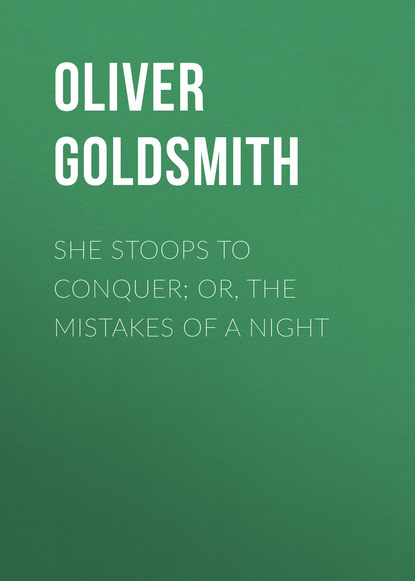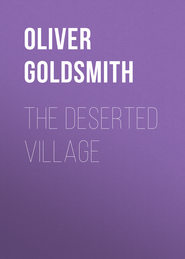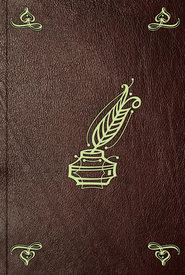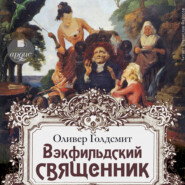По всем вопросам обращайтесь на: info@litportal.ru
(©) 2003-2024.
✖
She Stoops to Conquer; Or, The Mistakes of a Night
Настройки чтения
Размер шрифта
Высота строк
Поля
HASTINGS. Yes, yes, I have sent them to Marlow, who keeps the keys of our baggage. In the mean time, I'll go to prepare matters for our elopement. I have had the 'squire's promise of a fresh pair of horses; and if I should not see him again, will write him further directions. [Exit.]
MISS NEVILLE. Well! success attend you. In the mean time I'll go and amuse my aunt with the old pretence of a violent passion for my cousin. [Exit.]
Enter MARLOW, followed by a Servant.
MARLOW. I wonder what Hastings could mean by sending me so valuable a thing as a casket to keep for him, when he knows the only place I have is the seat of a post-coach at an inn-door. Have you deposited the casket with the landlady, as I ordered you? Have you put it into her own hands?
SERVANT. Yes, your honour.
MARLOW. She said she'd keep it safe, did she?
SERVANT. Yes, she said she'd keep it safe enough; she asked me how I came by it; and she said she had a great mind to make me give an account of myself. [Exit Servant.]
MARLOW. Ha! ha! ha! They're safe, however. What an unaccountable set of beings have we got amongst! This little bar-maid though runs in my head most strangely, and drives out the absurdities of all the rest of the family. She's mine, she must be mine, or I'm greatly mistaken.
Enter HASTINGS.
HASTINGS. Bless me! I quite forgot to tell her that I intended to prepare at the bottom of the garden. Marlow here, and in spirits too!
MARLOW. Give me joy, George! Crown me, shadow me with laurels! Well, George, after all, we modest fellows don't want for success among the women.
HASTINGS. Some women, you mean. But what success has your honour's modesty been crowned with now, that it grows so insolent upon us?
MARLOW. Didn't you see the tempting, brisk, lovely little thing, that runs about the house with a bunch of keys to its girdle?
HASTINGS. Well, and what then?
MARLOW. She's mine, you rogue you. Such fire, such motion, such eyes, such lips; but, egad! she would not let me kiss them though.
HASTINGS. But are you so sure, so very sure of her?
MARLOW. Why, man, she talked of showing me her work above stairs, and I am to improve the pattern.
HASTINGS. But how can you, Charles, go about to rob a woman of her honour?
MARLOW. Pshaw! pshaw! We all know the honour of the bar-maid of an inn. I don't intend to rob her, take my word for it; there's nothing in this house I shan't honestly pay for.
HASTINGS. I believe the girl has virtue.
MARLOW. And if she has, I should be the last man in the world that would attempt to corrupt it.
HASTINGS. You have taken care, I hope, of the casket I sent you to lock up? Is it in safety?
MARLOW. Yes, yes. It's safe enough. I have taken care of it. But how could you think the seat of a post-coach at an inn-door a place of safety? Ah! numskull! I have taken better precautions for you than you did for yourself – I have —
HASTINGS. What?
MARLOW. I have sent it to the landlady to keep for you.
HASTINGS. To the landlady!
MARLOW. The landlady.
HASTINGS. You did?
MARLOW. I did. She's to be answerable for its forthcoming, you know.
HASTINGS. Yes, she'll bring it forth with a witness.
MARLOW. Wasn't I right? I believe you'll allow that I acted prudently upon this occasion.
HASTINGS. (Aside.) He must not see my uneasiness.
MARLOW. You seem a little disconcerted though, methinks. Sure nothing has happened?
HASTINGS. No, nothing. Never was in better spirits in all my life. And so you left it with the landlady, who, no doubt, very readily undertook the charge.
MARLOW. Rather too readily. For she not only kept the casket, but, through her great precaution, was going to keep the messenger too. Ha! ha! ha!
HASTINGS. He! he! he! They're safe, however.
MARLOW. As a guinea in a miser's purse.
HASTINGS. (Aside.) So now all hopes of fortune are at an end, and we must set off without it. (To him.) Well, Charles, I'll leave you to your meditations on the pretty bar-maid, and, he! he! he! may you be as successful for yourself, as you have been for me! [Exit.]
MARLOW. Thank ye, George: I ask no more. Ha! ha! ha!
Enter HARDCASTLE.
HARDCASTLE. I no longer know my own house. It's turned all topsy-turvy. His servants have got drunk already. I'll bear it no longer; and yet, from my respect for his father, I'll be calm. (To him.) Mr. Marlow, your servant. I'm your very humble servant. (Bowing low.)
MARLOW. Sir, your humble servant. (Aside.) What's to be the wonder now?
HARDCASTLE. I believe, sir, you must be sensible, sir, that no man alive ought to be more welcome than your father's son, sir. I hope you think so?
MARLOW. I do from my soul, sir. I don't want much entreaty. I generally make my father's son welcome wherever he goes.
HARDCASTLE. I believe you do, from my soul, sir. But though I say nothing to your own conduct, that of your servants is insufferable. Their manner of drinking is setting a very bad example in this house, I assure you.
MARLOW. I protest, my very good sir, that is no fault of mine. If they don't drink as they ought, they are to blame. I ordered them not to spare the cellar. I did, I assure you. (To the side scene.) Here, let one of my servants come up. (To him.) My positive directions were, that as I did not drink myself, they should make up for my deficiencies below.
HARDCASTLE. Then they had your orders for what they do? I'm satisfied!
MARLOW. They had, I assure you. You shall hear from one of themselves.
Enter Servant, drunk.
MARLOW. You, Jeremy! Come forward, sirrah! What were my orders? Were you not told to drink freely, and call for what you thought fit, for the good of the house?












